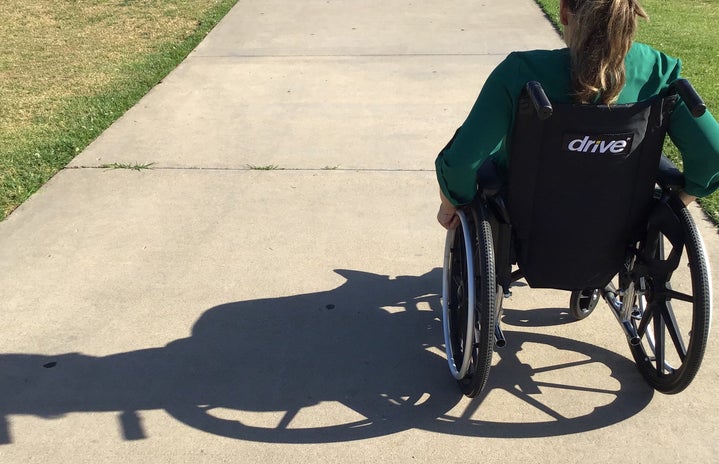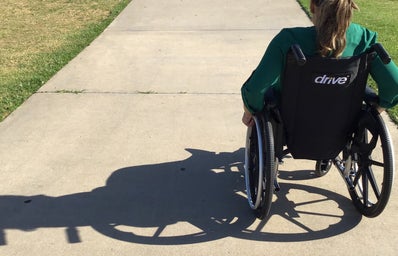The following piece is a group project by SLU students: Anna Singer, Camila Gonzalez, McKingleigh Nelsen, Nichole Bryan, and Dena Bischopink.
How often have you seen someone with a disability and automatically assumed they weren’t able to accomplish a task? Did you believe that just because they were a little different that they could not do what others can? These thoughts are ableist. Ableism is discrimination against those with disabilities. This discrimination is usually rooted in the idea that someone with a disability either needs special help or needs to be “fixed.” Ableism is by no means a new thing, and many people have done their part to try to make a difference. For example, at Saint Louis University (SLU), there is a group called SLUBA (SLU Beyond Ability). SLUBA dedicates their time to advocate for those with disabilities here on our campus and in the local community. SLUBA often brings in inspiring speakers with disabilities to discuss how they have overcome their own challenges and inform others about the struggles that come along with being disabled. Sometimes hearing this speaker is not enough, though. SLU is a diverse community, filled with a myriad of different people, each with their own different abilities. Our goal is to expose some of the stigmas and biases that are attributed to those who are considered disabled.
The first stigma many people hold about individuals with disabilities is that they all need help with everything. There are many types of disabilities and different ways a single disability can affect someone. Some individuals do need a lot of help, others are mostly independent, and some are fully independent. There are many people on our campus that have a disability, but are fully independent and are seeking a degree. It is important to keep in mind that you should not assume that someone needs assistance with everything because they have a disability. The best thing to do is ask the person if they need help and then act accordingly. Lead the conversation with kindness and offer assistance when needed.
The next stigma we would like to discuss is related to how many people treat those with disabilities. Many people assume that because someone has a physical disability, they also must have a cognitive disability, so they then talk down to them in an almost childlike manner. It is not okay to talk to someone with any disability, cognitive or physical, using baby talk, or patronize them by referring to them as “cute.” It is not right to assume someone’s intelligence based on their physical appearance. Doing this may seem like a way of being considerate or showing pity to the person with disabilities, but it can often be demeaning. The best way to address someone with disabilities is to speak to them as you would want to be spoken to. Do not treat someone with disabilities any differently or speak down to them because of their disability. Always talk directly to a person with a disability instead of talking about them to others. When having a conversation with someone who has a disability, look beyond the person’s ability and treat them with kindness and respect. This is especially important to do considering that many people at SLU will be going into the healthcare field and working with people who have disabilities. The Special Olympics uploaded a great video about treating people with cognitive disabilities with respect.
The final myth or stigma about people with disabilities has to do with relationships. Many people assume that people with disabilities are not or cannot be in romantic relationships. On that same note, when people with disabilities are out with their partner, people often assume that this partner is a caretaker or nurse. These assumptions have to stop because they are very hurtful. One resource to learn more about this stigma is Hannah and Shane, an inter-able couple. (Squirmy and Grubs on YouTube). Shane is a man with Spinal Muscular Atrophy and Hannah is an able-bodied woman. On their YouTube channel, they talk all about their relationships and some of the misconceptions and biases they face as a couple. One thing that this couple faces a lot is people assuming that Hannah could not be attracted to Shane because of his physical appearance. When I first learned about this couple, I thought that she must like him only for his personality and not his looks. In this situation, I had to check my own biases. Just because I am not attracted to someone, does not mean that they are not attractive. I would never assume that someone I didn’t think was attractive couldn’t be attractive if they didn’t have a disability, so I shouldn’t assume that for someone with a disability either. This is just one example of some of the ableist tendencies and biases that we all need to check.
Prejudices can come from all people who are unaware of ableism and those who are actively fighting ableism. The first time I realized my personal ableism was when I was working the front desk of a dance studio. This dance studio holds all-level adult classes to a diverse community in St. Louis. One of the clients is an adult man who has autism. I never questioned his ability to dance, in fact I was proud to work at a studio who did not even question his attendance to a ballet class. My ableism came forward when he needed to pay for class. His monthly membership payment was up, and I assumed that his personal assistant would pay. When I called him forward to pay, he took his own wallet out and let me know he was paying with his own money. I do not want to say I was surprised, but I was not expecting that. Making a payment is a simple task that I did not expect this man to be able to do. I did not voice my surprise to him or congratulate him for being able to pay because that would not be appropriate, but I acknowledged that internally, my assumption could have been degrading. I also noticed that he made a point to tell me this was his money. This leaves me to reflect his past experiences that would prompt his need to tell me that. Someone else has probably made the same assumption as me, and held that prejudice against him when he came to pay for a service, or food at the grocery store, or even a movie ticket at the theater. Although this is a minor situation to occur, this shed light to all the minor situations that will add up over time. One little thought, action or feeling can pile onto a lifetime of ableism for one individual.
It is important to remember that people with disabilities can still function as any other member of society would. Many people are quick to pass judgment when they see a person with a physical disability. being judgmental from the get-go may result in not getting to know the person that exists past the disability. Discriminating and excluding people with disabilities may be a result of not having many experiences around disabilities. Given the lack of experience and knowledge people have around disabilities, interactions with people that have them can be awkward or you might end up insulting them. When talking to someone with a disability and if meeting them for the first time, don’t lead with a question about their ability, but instead ask them questions about their life like you would anyone else on campus. This will make them feel respected and heard.
The best way to continue learning about people with disabilities is to listen to people with disabilities! There are so many resources available online made by people with disabilities. On Spotify, the podcasts “The Accessibility Stall” and “Disability Democracy” are really good. On YouTube, there are Jessica Kellgren-Fozar, Annie Elainey, and Judy Heumann (who was part of the disability rights movement in the 60s and is really cool). There is the documentary “Crip Camp” on Netflix, and of course, there are so many people to follow on Instagram. Alice Wong, who is a big advocate for accessibility, is a great resource on Instagram, as are Annie Elainey and Jessica Kellgren-Fozer, who were mentioned before. Also, SLUBA (SLU Beyond Abilities) is a great place to start and has its own Instagram page you can follow. Hearing the perspectives of people with disabilities and examining our own biases is the first step to combatting ableism.

